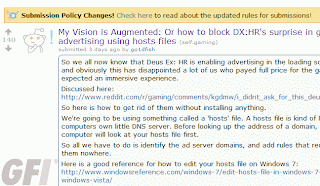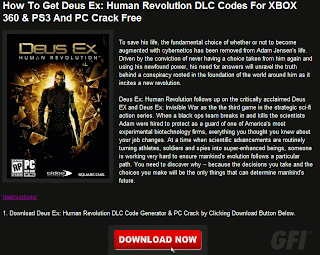In-game advertising has been around for a long time (specifically since 1978, when the Scott Adams game ‘Adventureland’ placed a promotional message in the game for his next release ‘Pirate Adventure‘, which involved crackers, a parrot and dying a lot).
There are three main types: Static (which as you probably guessed don’t do much other than sit there advertising things. They don’t change and can’t interact with the outside world), Dynamic (which are adverts effectively injected into the game world on the fly, meaning your futuristic shooter can have up to the minute posters on the wall for Pepsi or Alienware or whatever. These can also track gamers with regards successful advertising – for example, length of time spent staring at it when you should have been shooting at other gamers). The final type is ‘Advergaming” which would take way too much time to explain, so here’s the Wiki page. Go nuts.
Attempts at ingame advertising can be successful (Keanu billboards in The Matrix Online? Meta), somewhat innovative or run into teething troubles – more often than not on consoles where EULAs and other agreements may involve some hoop jumping to read.
You can see why gamers tend to be irked by advertising in their gaming, and a case in point would be a furore surrounding a recent patch applied to Deus Ex: Human Revolution (which is apparently not the cause of said advertising furore, it’s just some unfortunate timing.) Gamers are complaining about a somewhat noticeable addition to loading screens: see if you can spot it.
I’m not sure if it’s up there with the Vader “NOOOOOOOOOO”, but it certainly gives Midichlorians a run for their money. A rather bright and unavoidable Star Wars advert sits in the bottom right corner of the screen, pleading with you to use the Force and buy the boxset. A few more examples can be seen here and here.
As you may have guessed, people aren’t best pleased and the inevitable result is users attempting to game the system – you can see what I did there – and kill the ads off. Some are tweaking their Hosts file:
Others are downloading random patches and mods from the internet:
While there aren’t any reports of malicious patches compromising systems (though the above popular ad killer currently hits a 1/44 detection in VirusTotal which appears to be a “Wisdom of the Crowds” thing), I can’t say it’s a great idea to be downloading files and hoping they don’t blow your PC sky high. Another issue is that the game developers (or whoever is providing you the platform to play your PC game on, such as Steam) may not take kindly to tampering, and could theoretically ban your account / access / some other thing you can’t really go without.
This would not be a good thing.
Of course, “patches” and cracks are appearing on Youtube and similar sites, all of which result in survey popups and fakeout websites galore – this probably won’t matter one jot to anybody really desperate to hose that Star Wars promo and a clicking they will go:
…and so on. For me, the most interesting thing about this one is that the adverts have gone live a little while after the game has already sold a stack of copies – I’m struggling to think of ingame adverts that weren’t live from the moment the title was released, and this has contributed toward the negative reaction for what is a small (if distracting) advertisement. At any rate, it’s definitely created an opportunity for people with malicious intent to snag some victims, either by survey affiliate moneymaking or the ever present threat of infection files.
It may well be worth waiting to see if the adverts are pulled due to the negative reaction before deciding to download File X from Site Y while crossing your fingers.
And Han shot first.
Christopher Boyd







